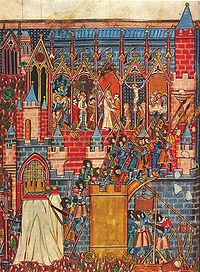I like this one. A long time ago, this pagan emperor persecuted the Christians because he thought they were a danger to the empire and to morals. Yep, that's right: to morals. Many hundreds of years after his death, he still gathers respect. His name was Marcus Aurelius Antonius Augustus, emperor of Rome. Wikipedia hast his about him:
Legacy and reputation
Marcus Aurelius took on the reputation of a philosopher king within his lifetime, and the title would remain his after death; both Dio and the biographer call him "the philosopher". [ 258 ] Christians—Justin Martyr, Athenagoras, Melito—gave him the title too. [ 259 ] The last named went so far as to call Marcus "more philantrophic and philosophic" than Pius and Hadrian, and set him against the persecuting and philosophy-hating Emperors Domitian and Nero to make the contrast bolder. [ 260 ]
This very good man proves that you don't have to be a Christian to have good morals. So does Socrates, by the way.
Now, let us talk about some other fine fellows. The bad reputation that accompanies these God-loving and God-fearing men falls primarily over the Catholic Church. It is conveniently forgotten that there were no other Christian churches at the time (whatever the Witnesses say about that). Let's see what the Wikipedia says these good and pious men did during the first crusade:
Massacre
Further information: Siege of Jerusalem (1099)#Massacre  The Siege of Jerusalem, as depicted in a medieval manuscript
The Siege of Jerusalem, as depicted in a medieval manuscript
The massacre which followed the capture of Jerusalem has attained particular notoriety, as a "juxtaposition of extreme violence and anguished faith". [ 88 ] The eyewitness accounts from the crusaders themselves leave little doubt that there was great slaughter in the aftermath of the siege. Nevertheless, the scale of the massacre has generally been exaggerated in later medieval sources, partly as a result of propaganda in Muslim sources, and partly as a result of the misinterpretation of the Crusaders' resort to apocalyptic language to describe the scenes. [ 87 ] It should also be remembered [citation needed] that massacre, repugnant though it might be, was an integral part of war throughout the ancient and medieval period. Contemporary Muslim reactions to the massacre were muted, when compared to later polemics on the subject. [ 87 ]
After the successful assault on the northern wall, the defenders fled to the Temple Mount, pursued by Tancred and his men. Arriving before the defenders could secure the area, Tancred's men assaulted the precint, butchering many of the defenders, with the remainder taking refuge in the Al-Aqsa Mosque. Tancred then called a halt to the slaughter, offering those in the mosque his protection. [ 87 ] When the defenders on the southern wall heard of the fall of the northern wall, they fled to the citadel, allowing Raymond and the Provencals to enter the city. Iftikhar al-Dawla, the commander of the garrison, struck a deal with Raymond, surrendering the citadel in return for being granted safe passage to Ascalon. [ 87 ] The slaughter continued for the rest of the day; Muslims were indiscriminately killed, and Jews who had taken refuge in their synagogue were murdered when it was burnt down by the Crusaders. The following day, in a particularly cold-blooded atrocity, Tancred's prisoners in the mosque were slaughtered. Nevertheless, it is clear that some Muslims and Jews survived the massacre, either escaping or being taken prisoner to be ransomed. [ 87 ] The Eastern Christian population of the city had been expelled before the siege by the governor, and thus escaped the massacre. [ 87 ]
And, before we go too far, let's look at one comment by the Wikipedist:
that massacre, repugnant though it might be, was an integral part of war throughout the ancient and medieval period
That's less of massacre, right? A good massacre, after all.
Any comments?
